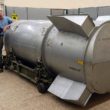Long Time Passing“The other day, I asked a young, but combat-experienced, sergeant where he was on 9/11. And his answer, ‘Getting my braces removed,’ reminded me that it has been more than eight years since 9/11.”
General Stanley McChrystal—December 8, 2009
The day after the Fort Hood shootings, a soldier’s wife told National Public Radio reporter Wade Goodwyn, “These things don’t happen to you.” The line reminded me of how far removed we are from the personal tragedies of two wars. I listened to Goodwyn’s story and went to the rowing dock on Town Lake, where I start my mornings when I’m in Austin. There I encountered eight amputees struggling to find their balance in two rowing hulls, their prosthetic legs standing in loose formation on the dock. Eight asymmetrical and physically unbalanced soldiers going at a sport that demands symmetry and balance. They were from Fort Sam Houston in San Antonio. They looked like enlisted men. It was their first day on the water.
There is something indecent about sending young men and women into war while so many of us incur no sacrifice.
California Democratic Representative Susan Davis got it right at the House Armed Services Committee hearing on December 8. “I continue to think that we’re still a military at war and not a nation at war,” Davis said. “And quite frankly, I’m not sure that we’re trying to address that problem.”
Representative David R. Obey, the Wisconsin Democrat who chairs the House Appropriations Committee, has a proposal that begins to address that problem. Obey’s “Share the Sacrifice Act of 2010″ (H.R. 4130) would impose a temporary surtax to pay for President Obama’s Afghan war escalation. The bill is elegant in its simplicity. In fewer than 1,000 words, it establishes a temporary graduated surcharge on net income tax liability that would cover the costs of the war in Afghanistan. The bill contains certain exemptions for post 9/11 military combat veterans and families.
The Washington Post‘s Walter Pincus ran the numbers. Obey’s bill would not affect those with adjusted gross incomes under $30,000. A 1 percent surtax—on the amount of tax owed—would be imposed on those earning up to $150,000 a year. The average family earning $50,000 a year would pay an extra $50. The increase for those earning $150,000 when the tax goes into effect in 2011 would be $226. For individuals or families earning more than $150,000, the surtax would be indexed to provide sufficient funding to cover the costs of the Afghan war.
“The problem in this country,” Obey said on ABC News, “is that the only people who have been asked to sacrifice are military families, and they have had to go to the well again and again, and everybody else is blithely unaffected by the war.”
GREAT GAME OR GREAT SOCIETY—Obey observed that President Lyndon Johnson’s “Great Society” was undone by the cost of the Vietnam war. (As was Johnson’s presidency.) By escalating the Afghanistan war without providing the revenue to pay for it, President Obama creates a similar risk for his domestic agenda.
“On the merits, I think it is a mistake to deepen our involvement,” Obey said. “But if we are going to do that we at least ought to pay for it. Because if we don’t, if we don’t pay for it, the Afghan war will wipe out every initiative we have to rebuild our own economy.”
By the conservative estimate of retired Army General Barry McCaffrey, who in November completed a strategic assessment of the Afghanistan war for General David Petraeus and General Stanley McChrystal, the troop increase that Obama ordered will cost $300 billion through 2013. That’s three years of health care reform, according to Congressional Budget Office figures. McCaffrey’s figure is probably too low, considering that Obama’s plan is predicated upon creating an Afghan defense force of 400,000, and Afghan President Hamid Karzai predicts that it will be 10 to 15 years before Afghanistan is in a position to fund its own military.
Michigan Democratic Senator Carl Levin supports a surtax. Nebraska Democratic Senator Ben Nelson—a persistent obstacle in the passage of health care reform—has proposed selling war bonds, arguing that it’s better to borrow from ourselves than to borrow from China. Health care obstructionist Joe Lieberman of Connecticut, an Independent who caucuses with the Democrats, supports Nelson’s war bonds proposal.
As is often the case, Dave Obey is spot on. A war surtax is good fiscal policy and good politics. It would require the American taxpayer to put some skin in the game—at least in a figurative sense. Were it to come to the floor for a vote, it would confront Republicans with the prospect of casting a vote against “the troops” and in favor of deficit spending to fund a war that Congressional Republicans have zealously supported.
LOYAL OPPOSITION?—Although Obey is a close ally of (and at times an adviser to) Speaker of the House Nancy Pelosi, the speaker opposes the surtax. At her December 3 press conference, Speaker Pelosi’s answer to a reporter’s question was painfully opaque.
“With the highest regard for Mr. Obey, this is his idea,” Pelosi said. “He is speaking for himself and the considerable reputation he enjoys in the Congress. When the president makes a request, we will make a judgment about what support it has, and some of that will relate to how it affects the deficit. The Bush administration has run up trillions of dollars in war costs. Not many people ever ask how it is going to be paid for on the Republican side….”
When a reporter pressed her for a straight answer, Pelosi was succinct: “I am not in support of the proposal of Mr. Obey.”
“It’s hard to move anything once the speaker throws cold water on it,” said a Democratic House staffer. Yet a few liberal members of the House Democratic Caucus continue to press the case and a few House staffers are discussing, off the record, the merits of the surtax.
Obey’s bill, when introduced, was co-sponsored by Democratic House progressives John Larson (CT), Anna Eshoo (CA), Barney Frank (MA), Raul Grijalva (AZ), Betty McCollum (MN), Jim McDermott (WA), James McGovern (MA), Linda Sanchez (CA), and Defense subcommittee Chairman John Murtha (PA). The list has grown to 18 co-sponsors.
Barring a groundswell of public support, Obey’s bill will likely die in the House. The Obama administration, working against what appears to be its own interest, is opposed to any war surtax.
OBAMA’S DISASTER—The war in Afghanistan is a disaster. That’s not my assessment, but rather, the informed opinion of Bruce Riedel, who coordinated an interagency analysis of the war for President Obama during the first months of the administration (and who supports President Obama’s decision to send 30,000 additional troops to Afghanistan).
Riedel is a former CIA officer who has advised three administrations on the Middle East and South Asia. His study concluded, among other things, that the Bush administration managed to snatch defeat from the jaws of victory in Afghanistan seven years ago.
“A war that had begun with a brilliant military success at virtually no cost was squandered and for seven years the previous administration dithered about Afghanistan and Pakistan and did not act,” Riedel said at a Jamestown Foundation conference in Washington, D.C., in December.
How does Riedel define “disaster”?
- The Taliban are winning the war.
- In eight years the U.S. effort in Afghanistan has succeeded in moving Al Qaeda’s core leadership, senior operational leaders, and propaganda operatives into an unknown location some 100 miles away in Pakistan.
- An insurgency that never should have been allowed to develop threatens the shaky Afghan government and is on the verge of defeating NATO’s first ground operation.
- Most of south and central Afghanistan is unstable and unsafe.
- It has been seven years since there has been any good intelligence on the whereabouts of Osama bin Laden.
- The Taliban and Al Qaeda have seized control of much of the Afghan prison system, from which they plan and launch attacks.
To underscore the final point, Riedel referred to a largely overlooked annex in the August 30, 2009, Afghanistan assessment that General Stanley McChrystal conducted at President Obama’s request. (The unclassified version of the report, leaked to the Washington Post‘s Bob Woodward, is widely available.)
On page 50 of the 66-page report, a section on Detainee Operations describes an Afghan prison system largely in control of Al Qaeda and the Taliban.
From within the prisons, the Islamists are radicalizing the general inmates and using the prisons as a base to conduct lethal operations against Afghan and allied forces. “Taliban/Al Qaeda leaders patiently coordinate and plan, unconcerned with interference from prison personnel or the military,” according to McChrystal’s assessment. And in many places, where Afghan prison facilities are under control of the Taliban, the question of interference from prison or military personnel is moot.
“When you have lost control of the prison camps in which you are putting insurgents in a counterinsurgency operation, you are in a deep, deep hole,” Riedel said.
A GRIM SNAPSHOT—A more recent assessment that General Barry McCaffrey completed for Generals David Petraeus and Stanley McChrystal provides another grim snapshot.
McCaffrey completed his report in November.
He found the Taliban flush with drug money from the Afghan poppy crop, well equipped, and heavily armed.
According to McCaffrey, the Taliban have established a “serious presence” (which I assume to mean a dominant presence) in 160 of 364 districts in the country, an increase of 30 districts since the Bush administration turned toward Iraq in 2003.
The Taliban’s most effective weapon doesn’t even require the insurgents to show their faces. They have perfected “massive anti-armor IEDs,” the roadside bombs that inflict most of the casualties on American and allied troops. In the month of July, the Taliban executed 828 IED attacks. McCaffrey predicts an annual count of 5,700 by the end of 2009.
The total casualty count will spike as new troops are deployed in regions controlled by the Taliban. Spring is the beginning of fighting season in Afghanistan. McCaffrey predicts that casualty rates this spring will climb to 300-500 a month. The 922-to-4,565 fatality-to-casualty ratio in Afghanistan through November 2009 is a grim predictor of U.S. fatalities as the war ramps up.
Despite the deteriorating conditions in Afghanistan, McCaffrey is optimistic about the prospects of turning the war around.
NINE BILLION A MONTH—McCaffrey also provided cost metrics for the escalation of the war. He projects a “burn rate” in excess of $9 billion per month in Afghanistan starting in 2010, once most of the 30,000 troops that Obama has ordered up are in place.
McCaffrey’s $108 billion per year estimate roughly conforms with the calculations of the Center for Strategic and Budgetary Assessments, a Washington think tank focused on national security. The CSBA predicts that Obama’s decision to increase troop strength in Afghanistan will require a $30 billion supplemental appropriation—on top of the $68 billion already in the 2010 budget.
A CSBA report released in December provides some insight into what’s behind the cost of the war.
The cost for each American soldier or marine deployed in Afghanistan in 2010 is projected at $1 million per soldier per year (compared to $400,000 in Iraq). The CSBA cites an economy of scale—a cheaper–by-the-dozen calculation—to explain some of the difference in cost. In 2009 there were 49,175 U.S. troops in Afghanistan, while 173,250 were deployed in Iraq.
But there are other factors. Compared to Afghanistan, Iraq is a developed country. Operating conditions in Afghanistan—where roads are in poor condition or non-existent and supply routes run thousands of miles overland—are more challenging and therefore more costly. Ninety percent of the logistics tail that connects to the army’s teeth in Afghanistan covers thousands of miles of bad roads—from Karachi, Pakistan, to supply depots in Bagram or Kandahar in Afghanistan.
Military planners often use the phrase “resource intensive.” In Afghanistan the war is fuel intensive. Each soldier or marine on the ground in Afghanistan consumes an average of 8,000 gallons of fuel per year—a level of consumption driven by what the CSBA describes as the high operational tempo of the war and the use of high-fuel-consumption weapons systems in the air and on the ground. At $25 to $45 per gallon, fuel costs account for $200,000 to $350,000 of cost per troop per year. The high price of fuel reflects the long convoy hauls and the fuel consumed by air and ground forces protecting the convoys.
If the past is any predictor, all the costs of this war will increase as it goes on.
HOW DEEP?—So are we “waist deep in the Big Muddy?” It seems so. But Riedel (and here the Pete Seeger analogy does not apply) says to go on. His argument, which evidently informed the president’s decision, regrettably strikes me as reasonable. Perhaps there is no choice. Defeat, in a war that should have been over two years into the Bush administration, will be a global game-changer. Most of the reverberations of the collapse of Afghanistan will be felt in Pakistan, the most unstable and most dangerous nation in the world—also home to the world’s fastest-growing nuclear arsenal.
For Afghanistan, there is also a moral argument that is rarely mentioned. The United States armed the jihadist insurgents who drove the Soviet Union out of Afghanistan and ultimately overthrew the pro-Soviet government of Mohammad Najibullah in 1992. Then the U.S. withdrew, leaving Afghanistan, first to the warlords, then to the Taliban.
Najibullah’s human rights abuses earned him the title “The Butcher of Kabul.” He was in no sense an innocent victim. But his capture, castration, torture and execution at the hands of the Taliban in Kabul in 1996, four years after his government fell, presaged the hell that the Islamist extremists would create in Afghanistan once they were in control.
The pre-medieval thugs who terrorized a nation—women in particular—are of American provenance.
Obama might be embarking on a fool’s errand (and the single foreign policy initiative that will define his presidency). It’s hard to say what would have been a better choice.






0 Comments